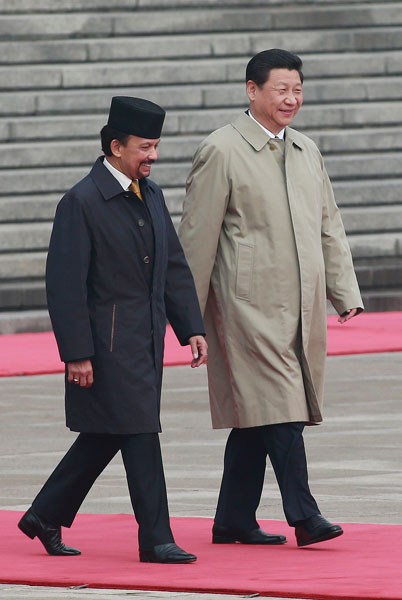China-ASEAN relations stand above disputes, leaders agreePresident
Xi Jinping reiterated on Friday China's commitment to a negotiated settlement ofdisputes related to the South China Sea, saying the country will not allow any factors to disturbthe China-
ASEAN cooperation.
Xi said China always undertakes to resolve disputes through friendly consultation andnegotiation.
 |
President Xi Jinping accompanies Sultan Hass Bolkiah of Bruneiduring a welcoming ceremony in front of the Great Hall of the Peoplein Beijing on Friday. [Photo by Feng Yongbin / China Daily] |
"Prior to the resolution, Chinais willing to enhance thedialogues and communicationwith ASEAN member countriesto jointly maintain the peaceand stability of the SouthChina Sea," said Xi whilemeeting with Brunei's SultanHass Bolkiah in
Beijing.
Xi said China is ready to workwith Brunei, which holdsASEAN's rotating presidencyin 2013, to adhere to thetheme of peace andcooperation to promoteChina-ASEAN relations.
"There should be no factor todisturb the China-ASEANfriendly cooperation process,"Xi said.
He said China has alwayeen devoted to friendshipand good neighborliness. "That is our sincere wish aswell as what we do," Xi said.
Hass is the first foreignleader Xi has received sincebeing elected president, a factthat Xi said underscores thegreat importance China hasattached to its relations withBrunei as well as ASEANcountries.
Hass said Brunei insiststhat all the parties shouldadhere to the spirit of theDeclaration on the Conduct ofParties in the South ChinaSea and seek a peacefulresolution to disputes.
The South China Sea issue should not affect ASEAN and China's friendly, cooperative ties, hesaid.
Premier
Li Keqiang also met with the Brunei guest late on Friday.
Li recalled the achievements of China and ASEAN countries over the past 10 years, saying thefuture and fates of both sides have never so closely interacted.
He echoed Xi's remarks, hoping that China, Brunei and other ASEAN nations work together toproperly deal with the South China Sea issue.
Hong Nong, a researcher at the National Institute for South China Sea Studies, said it isimportant that Brunei, the host state of this year's ASEAN summits and the East Asia Summit,declares its stance on the disputes related to South China Sea.
By reiterating Brunei's position on peaceful resolution, Bolkiah has conveyed to Beijing a clearand pragmatic signal from inside ASEAN, a positive move that a rotating chair state issupposed to play, said Hong.
He said dispute is only a all aspect set against the thriving Sino-ASEAN relations. Both sideshave to keep a cool head and not let this issue dominate or hijack other agendas.
Luo Yongkun, a researcher at the China Institute of ContemporaryInternational Relations, said Sino-ASEAN cooperation has beenmultifaceted and its prospects are unlikely to be undermined by disputes.
Talking about China-Brunei ties, Xi and Hass agreed thathuge potential for cooperation remains to be tapped in areas ofenergy, agriculture and infrastructure construction.
"Brunei fosters a very favorable investment environment," saidLiu Xinsheng, 75, the first residential Chinese ambassador toBrunei. "Its domestic stability, preferential tax policies andproximity to the markets of most ASEAN states, are among itain attractions to Chinese investors."
He said business cooperation between the two countries startedrelatively late and the Brunei market is limited. But bilateral tradebetween China and Brunei has seen vigorous growth since the establishment of the China-ASEAN free trade zone in 2010.
"Energy development is still a pillar industry in Brunei, but their infrastructure remainsinsufficient, which offers vast opportunities to Chinese investors, especially to privateenterprises," Liu said.
China recently approved a multibillion-dollar petrochemical project in Brunei from a privatecompany, Hengyi Group Co Ltd in Zhejiang province. It is the biggest investment by Chineseenterprises in Brunei.